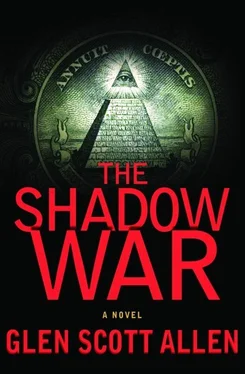Glen Allen - The shadow war
Здесь есть возможность читать онлайн «Glen Allen - The shadow war» весь текст электронной книги совершенно бесплатно (целиком полную версию без сокращений). В некоторых случаях можно слушать аудио, скачать через торрент в формате fb2 и присутствует краткое содержание. Жанр: Триллер, на английском языке. Описание произведения, (предисловие) а так же отзывы посетителей доступны на портале библиотеки ЛибКат.
- Название:The shadow war
- Автор:
- Жанр:
- Год:неизвестен
- ISBN:нет данных
- Рейтинг книги:5 / 5. Голосов: 1
-
Избранное:Добавить в избранное
- Отзывы:
-
Ваша оценка:
- 100
- 1
- 2
- 3
- 4
- 5
The shadow war: краткое содержание, описание и аннотация
Предлагаем к чтению аннотацию, описание, краткое содержание или предисловие (зависит от того, что написал сам автор книги «The shadow war»). Если вы не нашли необходимую информацию о книге — напишите в комментариях, мы постараемся отыскать её.
The shadow war — читать онлайн бесплатно полную книгу (весь текст) целиком
Ниже представлен текст книги, разбитый по страницам. Система сохранения места последней прочитанной страницы, позволяет с удобством читать онлайн бесплатно книгу «The shadow war», без необходимости каждый раз заново искать на чём Вы остановились. Поставьте закладку, и сможете в любой момент перейти на страницу, на которой закончили чтение.
Интервал:
Закладка:
The next morning dawned as bleak and chill as any of that March. Rising even earlier than usual, Washington dressed slowly, putting on his full dress uniform, complete with red sash and bright rows of medals. When he was ready, he threw on his greatcloak-the same he'd worn that fateful Christmas night in the crossing to Trenton, though now considerably more frayed and patched-and left his quarters, walking slowly across the crunching ground to the long, narrow wooden building his men had completed just a month before; a place meant to serve as the one warm sanctuary in camp where men might gather to drink and play at cards, and which had been named, with a certain ironic military humor, the Temple of Virtue. Adjusting the coat upon his shoulders, he opened the door and entered.
The room was warm from the large stove in the center, and musky with the scent of canvas and leather and men too long from the niceties of bath and soap. Rows of churchlike pews faced a small lectern set at the front of the hall; the pews, he was distressed to see, were full with all ranks of his officer corps.
There was a cacophony of voices as he entered, men shouting, declaiming, some standing as if ready to come to blows. And then a few saw him at the doorway, and nudged their neighbors, and so on until the hall fell almost silent. All heads turned as he walked slowly down the center aisle of the hall, and most displayed a look of shock. Other than the hiss and crackle of wood in the stove, for a moment the only sound was the slap of his boots on the floorboards.
Behind the lectern stood, of course, Major General Horatio Lloyd Gates, also in full dress uniform. Clearly, Gates was as shocked to see him as anyone else in the hall. He'd been about to speak when Washington entered.
"General Gates," Washington said, standing next to him.
Gates was at first flustered, then remembered himself and saluted. "General Washington," he said nervously.
"General," Washington repeated, "do I have your permission to address this assemblage?"
Now Gates looked terrified. "Of course, General Washington," he said. "Uh… please," and he moved aside from the lectern.
Washington moved behind the podium and surveyed the room. He waited until he had every pair of eyes upon him. And then, with a movement deliberate and graceful, he reached into his greatcloak's pocket.
"Gentlemen," he said, "you will permit me to put on my spectacles, for I have not only grown gray but almost blind in the service of my country."
There was absolute silence. He realized most of the men in the room didn't even know he wore spectacles. And he saw that his comment had had the desired effect, their faces expressing shame in the face of Washington's humble admission of all he'd given to the Cause these past seven terrible years. As he looked around the room, here and there men dropped their gaze, unable to look him in the eyes.
He then drew his speech from his pocket, the one he'd labored all night to produce. But even as he read from it, he knew it was unnecessary; he could feel the shift in the room's sentiment. He knew that when he finished, thanked them for their attention, and left, they would never be able to pledge themselves to open rebellion again.
CHAPTER 17
"Astounding," Wolfe said when Benjamin had finished the story. "That certainly wasn't covered in my high school history of the Revolutionary War."
"Nor anyone else's," said Benjamin. "For decades after the war, it simply wasn't spoken about, by either side. Once the Treaty of Paris was signed and the war successfully over, certainly the conspirators didn't want their names associated with such a betrayal. And for Washington's side… well, he thought the country too fragile to know it had survived its birth by a pair of spectacles.
"And years later, when some of the facts came out, the argument was it had all been something of a joke, a tempest in a teapot. Other historians, however, my father for instance, have taken it more seriously. He thought Hamilton's group didn't necessarily want a real coup, just the threat of one, a 'crisis' that would allow them to establish martial law, get the money the army was owed, and establish a more powerful and restrictive central government, and not the general democracy of Washington, Jefferson, Franklin… well, the majority of the Founding Fathers. But true democracy was something Hamilton and a few others had been opposed to ever since the Revolution began."
"And who besides this Gates was definitely involved in this almost coup?"
"That's always been a little vague, though one of the ringleaders was almost certainly Hamilton."
"But there's no proof?"
"Well, not what you would call proof. You see, the group that supported Gates-a General Alexander McDougall, a Colonel Walter Stewart, and a Major John Brooks-had exchanged letters during the whole affair. Some of them came to light years later, and in them they'd used code names to refer to one another. McDougall's was 'Brutus.' "
Wolfe laughed. "How appropriate."
"And there were mentions in some of their letters to another group, or club, whatever you want to call it, which supposedly included Gates and some other proaristocracy types, a sort of anti -Masonic society. These letters made reference to another code name, someone they called 'the Indian Laird,' in a way that suggested he was either the founder of this anti-Masonic group, or a very prominent member."
"Indian Laird?" asked Wolfe.
"Alexander Hamilton was born in the West Indies. And he was the illegitimate grandson of a Scottish laird."
"All right, that gets us Hamilton's connection to the conspiracy perhaps. But not Fletcher's interest in it."
"A prominent New Englander was also implicated in the plot. One Gouverneur Morris. He was famous-or perhaps infamous is a better word-for stating that no successful country ever existed without an aristocracy, and that voting should be restricted to those who owned property."
Wolfe chuckled, then a thought struck him. "Morris?" Wolfe said with surprise. "As in Seaton Morris's family?"
"I'm not sure," said Benjamin. "But it would be quite a coincidence, wouldn't it."
"Like Freud, I don't believe in coincidences," Wolfe said. "So you think Fletcher's interest in the diary led him to Morris, and Morris led him to this Newburgh plot? But still, what does either have to do with Indians or Puritans?"
"I don't know," said Benjamin. "I don't understand it yet, really." He was quiet for a moment. "But the other night I read over my father's notes about Bainbridge, and there are extracts from two of his letters. In one of them, Bainbridge used this word 'Puramis' in a rather odd context. And my father had made a very curious mark by that word. I'm not certain, but-"
"Here we are," Wolfe interrupted him, turning into a side road. "Soon we'll have this precious diary in front of us and we can settle all these questions."
Wolfe turned the car through the gates of the Morris Estate-and Benjamin decided the word "palatial" was perhaps an understatement.
CHAPTER 18
Samuel drove through two redbrick pillared gates into the long, graveled driveway of the Morris Estate. As they passed down a lane of overarching oak trees, Benjamin's first reaction was that the grounds looked remarkably like the Foundation-the same Colonial architecture of red brick with white trim, the same carefully arranged flower gardens, the same sense of protected privilege.
But here there was also a sense of immense personal rather than public power. As they pulled up near the front door, Benjamin noticed that, rather than the typical bull's-eye window in the attic far overhead, there was a stained-glass rendering of a coat of arms.
As they got out of the car and approached the front porch, he could see a glassed hothouse set apart to the left, and some other smaller buildings farther back, on the right. Benjamin counted two Mercedes, a BMW, a Jaguar, and a champagne-colored Bentley parked in the driveway.
Читать дальшеИнтервал:
Закладка:
Похожие книги на «The shadow war»
Представляем Вашему вниманию похожие книги на «The shadow war» списком для выбора. Мы отобрали схожую по названию и смыслу литературу в надежде предоставить читателям больше вариантов отыскать новые, интересные, ещё непрочитанные произведения.
Обсуждение, отзывы о книге «The shadow war» и просто собственные мнения читателей. Оставьте ваши комментарии, напишите, что Вы думаете о произведении, его смысле или главных героях. Укажите что конкретно понравилось, а что нет, и почему Вы так считаете.












